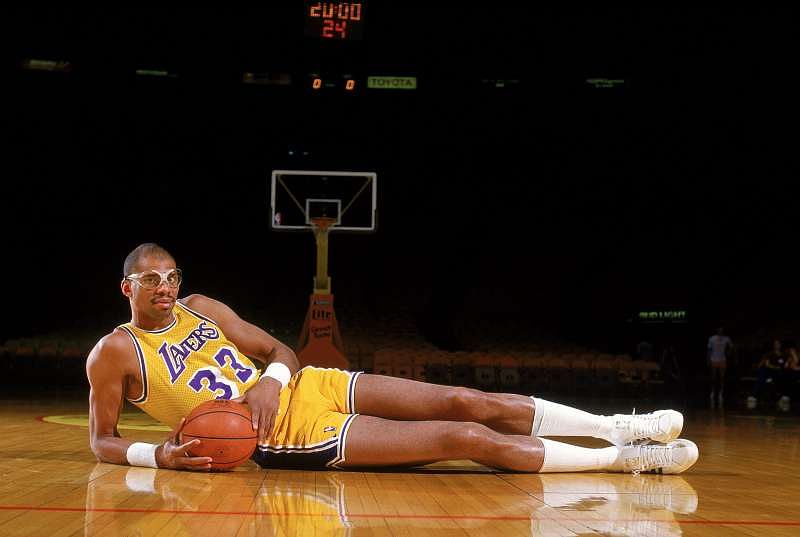It goes without saying that Kareem Abdul-Jabbar is one of the greatest basketball players of all time. He has been crowned NBA champion six times and has collected many prestigious individual titles including the NBA MVP and NBA Finals MVP awards.
Milwaukee Bucks selected him as the first pick of the 1969 NBA draft, and two years later (1971), they celebrated the championship together.
In 1975, the 2.18m legendary centre left the Bucks and joined the Los Angeles Lakers. The Lakers then went on to dominate the NBA during the 1980s; they won the championship on five occasions (1980, 1982, 1985, 1987, 1988). And Jabbar was the star, which was the case in all of his teams.
Due to his significant contributions, Jabbar’s No. 33 jersey was retired by his college UCLA, the Bucks and the Lakers. He stayed at the Los Angeles side for 14 years before retiring in 1989.
Explore the NBA Draft 2024 with our free NBA Mock Draft Simulator & be the GM of your favorite NBA team.
Also read: Amar'e Stoudemire: "LeBron will lead Cleveland to the 2017 NBA finals"
His successful career in basketball lasted 20 years, but Jabbar didn't stop his professional journey there. The New York City-born NBA legend continued to shine outside of basketball. Activism and writing are among his numerous occupations, which keep him in the limelight.
Recently, Jabbar received an important honour from the 44th President of the United States, Barack Obama. He was awarded the Presidential Medal of Freedom, which recognises ‘meritorious contribution to the security or national interests of the United States, world peace, cultural or other significant public or private endeavours.’
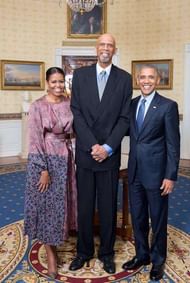
Sportskeeda interviewed Abdul-Jabbar, who described in detail some of the most prominent moments he experienced in the NBA. He also gave his views on the recent state of the game.
Here are a few excerpts from the interview:
Q: You are one of the greatest NBA players of all time. A majority of basketball fans consider you to be the best centre in NBA history. How do you look back at your incredible success, 27 years after your retirement?
KAJ: I don’t really think about my career that much, any more than the average person thinks about high school, 27 years after graduating. Certainly, I’m grateful for it and for the fans whose nostalgia keeps me prominent in their hearts. I’m happy that I was able to give them so many great memories.
But these days I think more about how my success in basketball allowed me to pursue other interests, including political activism and my writing. I’m able to speak to large audiences about education, social inequalities, and the effects of pop culture.
Q: You won the NBA championship six times and received numerous individual awards as well. Is there a dream that you didn't fulfil?
KAJ: All I ever wanted to do was play to the best of my abilities, just as Coach Wooden had taught me at UCLA. My philosophy was that if I kept pushing myself to be better, then winning would follow. It did. So did the awards and records.
But they were just a happy by-product of me striving to be the best player I was capable of becoming and never admitting I had reached my limit. So, I never really dreamed of any particular honour, but I am just a little disappointed that I didn’t get to be MVP in the All-Star game.
Q: Who were your favourite teammate, opponent and coach?
KAJ: James Worthy and I got along very well both on and off the court. Like me, he was a big fan of jazz and we would talk about jazz musicians as much as we did about NBA players. He also shared my interest in black culture and history. I’d give him books about black history during the Civil War and other time periods and we’d talk about them, too.
On the court, James had an uncanny ability to anticipate when we were about to snag a rebound and bolt down the court. He was the fastest guy in the league and it was fun to watch players get frustrated trying to catch up to him.
Dan Issel from the Denver Nuggets was my favourite opponent because his style of play challenged me. He was one of the nicest guys, but he had four missing teeth from the top row which made him a comical sight. He was a deadly shooter from the outside, forcing me go out to the three-point line to guard him. That made me less effective. On the other hand, Dan couldn’t guard me very well. He was only 6’9” and I could box him out at will.
(Video courtesy: Karolismic YouTube channel)
Paul Westhead was my favourite coach because he taught Shakespeare and I was an enthusiastic fan of Shakespeare. We would sometimes discuss Bard’s plays and I benefited from his extensive knowledge. He also amused us by comparing the team to characters in Shakespeare’s plays. He compared me to Othello because I was an effective leader but misunderstood by others. He thought Magic was like Falstaff because he enjoyed life with such gusto.
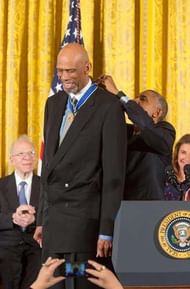
Q: What would you say was the most intense moment of your career?
KAJ: The night of the deadliest punch in NBA history. On December 9, 1977, we were playing the Houston Rockets. The Lakers’ Kermit Washington and the Rockets’ Kevin Kunnert got into a minor scuffle after Kermit tugged on Kevin’s shorts. Kevin elbowed Kermit and Kermit punched him. I grabbed Kevin around the arms to break up the fight.
The Rockets’ Rudy Tomjanovich ran full speed down the court to help break up the fight. Kermit thought he was being attacked and threw a straight-armed punch into Rudy’s face. It sounded like a watermelon smashing against cement. Rudy dropped to the floor, cracking his head. He had spinal fluid leaking into the back of his throat. The doctors who operated on him said repairing his skull was like trying to piece together a broken egg.
Even thinking about it now makes me a little sick to my stomach.
Q: You were the first pick of the NBA draft in 1969 and you reached the top from there. This is an exception in the NBA, especially in the last few years; No. 1 picks in the draft don't normally meet the high expectations. Could you give us your views on that?
KAJ: Players who don’t learn all the nuances and fundamentals of the game in college are at a disadvantage when they hit the pros. The game is faster, rougher, and much more cerebral than in college. If they aren’t taught the subtleties of the game early, they are unable to make winning plays at key times in a contest.
When you walk onto the court in your rookie year in the pros, you’re going up against the best players in the world. The thin edge that gives some players an advantage over equally talented players is the ability to adapt and react to the shifts in the game without thinking.
Q: You won the NBA championship with both of your teams, Milwaukee Bucks and Los Angeles Lakers. Do you think they can become great teams again?
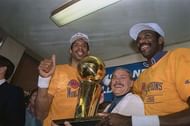
KAJ: I think the Bucks’ new owners are smart and patient, which is a combination of talents that spell ‘win’ over the long run. The Lakers have the good fortune to have a historical legacy of greatness, which is an advantage in attracting players. Right now, they need to warehouse assets and wheel and deal until they get the right combination of players.
They already have some impressive young talents, but building the right balance of teammates can be a long process until you get lucky. We got lucky when we traded the excellent Gail Goodrich to New Orleans Jazz for a first-round draft pick who turned out to be Magic Johnson.
Q: Kobe Bryant retired a few months ago. How likely do you think it is for the Lakers to ever find a player like him again?
KAJ: Inevitably, there will be more players like Kobe, but who can say if that player will be a Laker? The management must have that rare combination of ability to spot potential talent early and commitment to nurture that talent in order to build a great team.
There is nothing more exciting than watching a good player with potential bloom into a great player. There are plenty of players with potential who never develop past that.
Q: History has shown that a great player can help a team win the NBA championship; you and LeBron James are examples of that. Do you consider it a general "rule” that if a squad contains a great player, they have a chance to win the title?
KAJ: That depends on how you define “great player.” There are plenty of amazing players who can score and pass and dribble. They rack up high personal stats each game, yet their team keeps losing.
The key to winning is as corny as the lesson in every high school sports movie ever made: teamwork. Star players who can’t harmonise with the rest of the team actually keep their teams from getting better and winning. They are harming the careers of their teammates and hurting the franchise.
Q: Kobe Bryant, Kevin Garnett and Tim Duncan all retired in the same season (2015/16). Do you think there are players in the league who can assume their roles going forward?
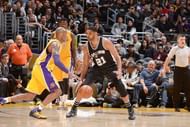
KAJ: LeBron James and Steph Curry are great spokespersons for the NBA. LeBron is an amazing player, plus he’s got a humble but outgoing personality that makes him likeable. He’s not afraid to take political stands against social injustice.
Steph is also an exceptional player, though not as vocal as LeBron. He’s still pretty young so he has time to grow into the role.
Q: Could you share your insights on the current season of the NBA? Will the Cavaliers win it again? Can the Warriors return to the throne after a one-year break or will there be other teams competing for the title??
KAJ: January is the month when the trends start to become obvious among the winners and also-rans of the NBA. This is when injuries take their toll and some teams just give up. Right now Cleveland and Golden State are looking pretty good. Houston has had ups and downs, but they have a great leader in James Harden, so there’s some hope there.
Q: What are your thoughts on Kevin Durant playing for the Warriors? Are you in favour of star players teaming up?
KAJ: Players should be able to play wherever they are wanted. Kevin played for Oklahoma City for nine years before moving on. He even helped them get to the finals in 2012. He played his heart out every game, which is all fans can expect. Clearly, he thought that going to the Warriors would be an opportunity for him and it’s proven to be just that. He’s had a terrific season so far.
Q: Do you think any active player in the NBA can replicate your signature sky hook shot?
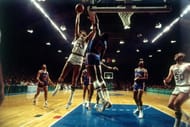
KAJ: There are some players who have the skill to shoot the hook but nobody is using it as a mainstay of their game. That baffles me because the shot can’t be blocked. The hook is one of the most effective shots in the game, yet players rarely use it.
But someone will figure out just how unstoppable it can be and they’ll practice it until it becomes second nature. Then they’ll start breaking records.
Q: Apart from basketball, you have also been engaged in film, television, activism and cultural activities. What message do you want to convey to the world through these media?
KAJ: Most people don’t realise that I have been a writer and activist for more years than I played basketball. I interviewed Martin Luther King, Jr. for a Harlem paper when I was a senior in high school. So, the passion to write was always there, as well as the desire to write about social issues that matter.
It’s hard to grow up a person of colour in America and not be concerned about social injustice against marginalised groups. My writing is an effort to address those inequalities while helping people understand why it’s so important to fight them.
Sometimes I write works just to celebrate black culture. Even in my comic books and novels, I try to include some social commentary along with the entertaining plot.
Also Read: How many rings does Kareem Abdul Jabbar have?
Rockets Fan? Check out the latest Houston Rockets depth chart, schedule, and roster updates all in one place.
